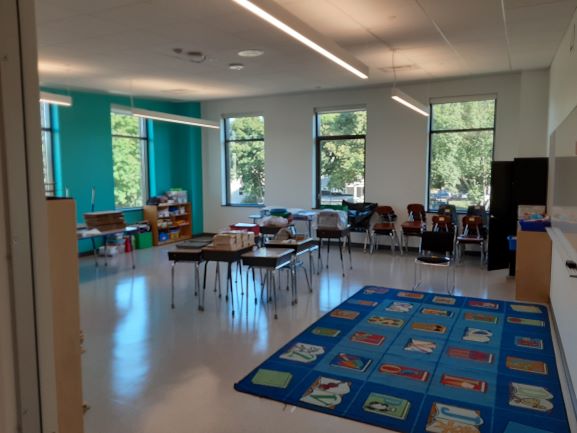Our Present

In the fall of 2020, Conservatory Lab students were able to come to our brand new building at 395 Columbia Road for a hybrid orientation period before a period of remote instruction. As students began returning permanently to the building, starting in January of 2021, the joy on their faces as they played in the gym, and the trill of instruments ringing through the hall made it clear that we are finally HOME!
As Conservatory Lab sets down roots in Upham’s Corner, the compounding challenges of racism and the pandemic make our mission of ensuring access to a quality public education for our 450 students more urgent than ever. We believe in the power of music and content-driven instruction to provide a deep motivator and connector. When young people learn to be curious and deeply engaged through project-based academics, they can refine the skills, tools, and mindsets they will need for lifelong success.
Our History
Founded in 1999 by Rhoda Bernard, Lyle Davidson, Larry Scripp, and Mary Street, Conservatory Lab Charter School opened its doors with a mission to shape lives through a music-rich education. The school promised to “provide an opportunity for inner city school children to achieve the highest standards of academic achievement in the context of continuous and comprehensive study of music.” At the heart of our unique mission lies the belief that every child has the ability to strive for and achieve excellence, to contribute to the broader community, and to learn to experience and express music deeply. Sixteen years later, the school has evolved into a pioneer Boston public charter school with an innovative model and curriculum that schools across the nation seek to learn from and replicate.
Under the leadership of former Head of School Diana Lam, the school’s academic and music programs underwent a dramatic shift that resulted in a surge in students’ academic performance, creative output, and musical skills. In 2009, Conservatory Lab became an Expeditionary Learning School and, through intensive professional development and coaching, began to develop new interdisciplinary curriculum designs and child-centered instructional practices that engage students in experiential and inquiry-based learning and stimulates deep and complex thinking across content areas.

The following year, Conservatory Lab extended the length of the school day and became the first elementary school in the United States to fully integrate the El Sistema music program. Founded in 1975 in Venezuela, El Sistema was designed to effect social change and nurture promising futures for underserved communities through intensive, ensemble-based music education. El Sistema at Conservatory Lab believes that the pursuit of musical excellence teachers students to strive for quality in all areas of their lives. The orchestra serves as a model society that emphasizes cooperation and collaboration over competition. Our El Sistema program provides daily music instruction by talented and professionally trained resident artists, our students’ musical skills have risen to astonishing levels of precision and musical complexity. Our orchestras and ensembles are in high demand to perform masterworks alongside professional ensembles at large iconic venues, as well as to perform at high profile cultural events and activities throughout Boston.
The combination of Expeditionary Learning and El Sistema has been a dynamic force in the development of our school. Both programs foster the development of a growth mindset and share an emphasis on inquiry-based, goal-oriented learning, as well as engaging students through creative expression and intentional collaborations with peers and adult experts. Students gain agency, and take ownership of their learning, allowing them to excel.
In response to the success of our model, the Massachusetts Department of Elementary and Secondary Education approved an increase in our enrollment in March 2013. Conservatory Lab grew from a student body of 169 students in one location to 444 students in two locations in Dorchester. This rapid growth has enabled us to offer an equitable educational opportunity to a larger and more diverse urban population, all lottery-chosen, and to expand the impact of Conservatory Lab’s innovative model. In addition, doubling the number of classes at each grade level has enhanced opportunities for collaboration amongst our faculty, and enabled the addition of a middle school, offering our elementary students a bridge to continue their music education.

In order to strengthen organizational structures so that students can thrive, in 2016 Conservatory Lab Charter School shifted to a co-leadership model in which the school is run by the Principal, Nicole Mack, and Chief Operating Officer John Chistolini. In 2019, the boards of Conservatory Lab Charter School and Conservatory Lab Foundation collaborated to create a strategic plan, which outlines four goals:
- Conservatory Lab will be a top-performing charter school as measured by student outcomes and retention, strong levels of family and community engagement, and a superb and committed faculty
- Attain the goal to be a school for the nation through local and national dissemination of our model, and the development of an arts-pathway for our students.
- Strengthen key organizational structures, operations, and systems to build strong relationships with partners.
- Ensure financial sustainability by refining its financial model, management, and fundraising strategies to balance priorities in an evolving context.
In the fall of 2020 Conservatory Lab Charter School opened a campus in Dorchester’s Upham’s Corner which includes classrooms, science labs, and performance spaces. It is hoped that the school will host events for our community in the large Learning Commons which includes acoustic panels, and a large forum-style staircase for gathering. The completion of this $30 million capital project represents a huge step for the long term sustainability of the school. Most importantly it represents a permanent home that will have an impact on the students who attend the school, their families, and our community.
